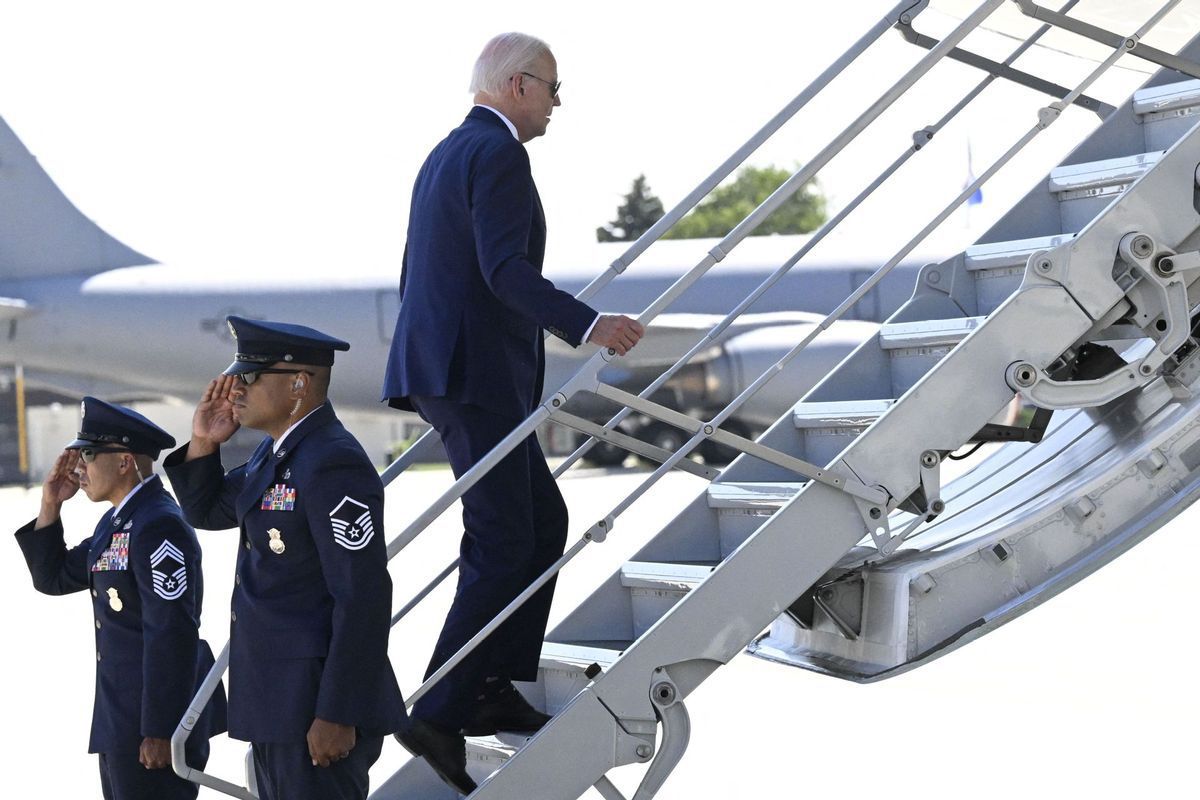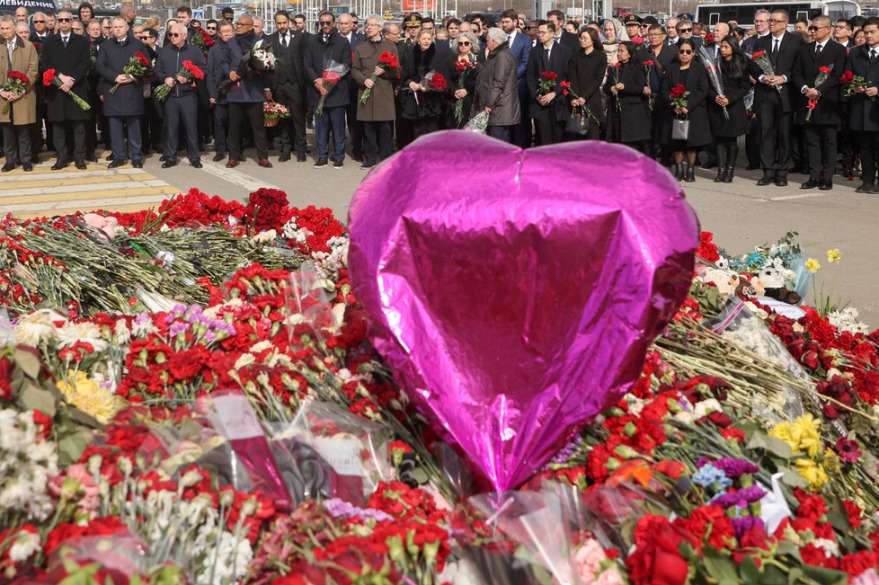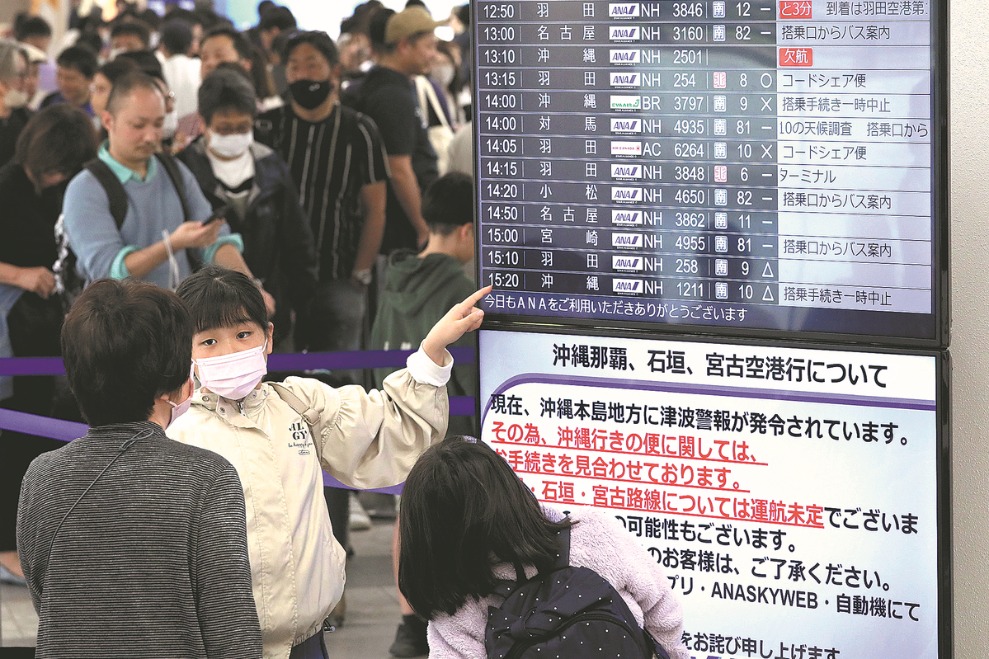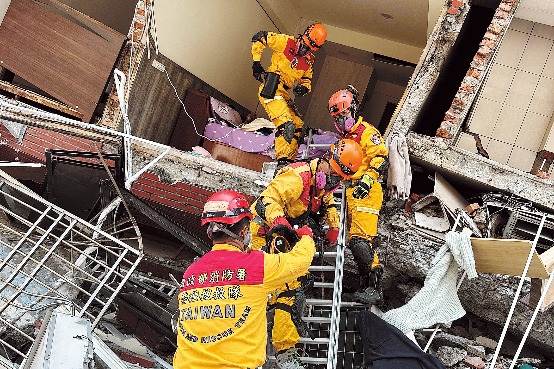Camp David summit endangers Asia-Pacific
By Zhang Weiwei | China Daily | Updated: 2023-08-18 07:13

US President Joe Biden, Japanese Prime Minister Fumio Kishida and Republic of Korea President Yoon Suk-yeol will hold a summit at Camp David near Washington DC on Friday, where they are expected to announce plans to expand trilateral cooperation.
But since this is the first visit by any foreign leader to the presidential resort after Biden took office, there is more to the meeting than meets the eye.
Media reports say Washington is pushing for a "joint statement", and the three countries are likely to strengthen their trilateral relationship and discuss the possibility of establishing a mechanism to hold regular meetings. However, the "historic trilateral dialogue", hyped up by the three countries, is sending a dangerous message to the Asia-Pacific region.
As one of the 10 core strains of the US "Indo-Pacific Strategy", the US-Japan-ROK cooperation aims to integrate the US' two most important alliances in the Asia-Pacific region (the US-Japan and US-ROK alliances) into a trilateral alliance.
The Biden administration has been both cajoling and coercing Japan and the ROK to help it compete with, and check the rise of, China. The administration has also been using the Ukraine crisis to strengthen its alliances in the Asia-Pacific.
The US-Japan and US-ROK alliances are products of the Cold War era. The former has become a cornerstone for maintaining the US' interests in the Asia-Pacific while the latter, so far, mainly focuses on the Korean Peninsula issue. Although Washington has tried several times to expand the US-ROK alliance to cover other issues, previous ROK governments largely maintained restraint given the importance they attached to China-ROK relations and the sensitivity of ROK-Japan ties.
But immediately after taking office in May 2022, Yoon reached an agreement with Biden to upgrade the US-ROK military alliance to a global comprehensive strategic alliance. Later, Seoul paved the way for US-Japan-ROK cooperation by granting unilateral concessions to Japan on the World War II forced labor issue. And during the past year, the three countries' leaders have held trilateral talks on the sidelines of multilateral meetings such as the NATO Summit, the East Asia Summit and the G7 Summit.
At the Camp David meeting, the three sides are expected to formally lay out their cooperation framework, which could carry hidden risks for the Asia-Pacific.
First, the formalization of the trilateral military alliance will very likely heighten tensions on the Korean Peninsula. The three countries intend to strengthen their military cooperation by establishing a trilateral mechanism, including sharing real-time data on early warning of the DPRK's missile launches, improving their ability to detect and evaluate the DPRK's missile capabilities, and strengthening their deterrence against the DPRK. Such a move has the potential to send the peninsula's nuclear issue into a vicious spiral.
In 2018, the DPRK announced it would stop nuclear tests and impose a moratorium on long-range missile testing. The DPRK also said it would focus more on economic and social development. However, the US did not seize the opportunity or try to resolve the denuclearization issue. And the Biden administration, instead of trying to engage with the DPRK, exploited the tensions to strengthen its alliances with Japan and the ROK.
The US, Japan and the ROK have conducted a number of joint anti-missile and anti-submarine exercises since June last year. Last month, a US nuclear-powered submarine berthed at an ROK port for the first time in over four decades, which they said would serve as deterrence against the DPRK, but history shows that strengthened deterrence can trigger new crises.
Second, Japan's and the ROK's full compliance with the US' military strategy in the Asia-Pacific could escalate tensions with China. The US, Japan and the ROK issued the Phnom Penh Statement on Trilateral Partnership for the Indo-Pacific, declaring for the first time that the trilateral partnership was aimed at maintaining security in the whole "Indo-Pacific region". In June, the defense ministers of the three countries issued a joint statement, mentioning the situation in the Taiwan Strait, and saying that they will jointly address the security challenges in the "Indo-Pacific" through information sharing, high-level policy consultations and trilateral military drills.
If Japan and the ROK finally get on board with the US and their activities undermine China's sovereignty and national interests, they will heighten tensions and could even spark confrontation with China.
Japan released three documents at the end of last year redefining its security posture. Now, it has abandoned the principle of defense-oriented strategy and boosted its counterstrike capability. Japan has also allowed the US to station an advanced Marine Corps unit in Okinawa by 2025.
As for the ROK and the US, they have decided to establish a bilateral "nuclear consultative group". And the US is considering forming a new trilateral consultative mechanism to strengthen the three sides' common nuclear deterrence.
These moves go well beyond the peninsula nuclear issue and will have a destabilizing effect on the whole Asia-Pacific region.
Third, Japan and the ROK have been frequently interacting with the North Atlantic Treaty Organization, aiding it to expand eastward and stirring up troubles in the region. And compared with the US-led Asia-Pacific alliances, NATO is a more systematic organization and focuses more on real combat.
The US has been inciting other NATO members to persuade them to intervene in the Asia-Pacific and encouraging its Asian allies to cooperate with NATO.Japan and the ROK have joined the NATO Cooperative Cyber Defence Centre of Excellence and signed the Individually Tailored Partnership Program with NATO, among other things, to strengthen cooperation on cybersecurity in order to combat fake news and hold high-level political military dialogue and joint drills.
Also, Japan and the ROK took part in the NATO summits of 2022 and 2023, and have become the transatlantic military alliance's most important partners in Asia, with NATO Secretary General Jens Stoltenberg visiting the two countries early this year to discuss NATO's plan to establish a liaison office in Tokyo and measures to boost cooperation. The strengthening of US-Japan-ROK military alliance and NATO's expansion into the Asia-Pacific will foster a "new Cold War "atmosphere in the region, raise the risks of conflict and undermine peace and development.
And fourth, given the great importance they attach to "economic security", the US, Japan and the ROK could end up fragmenting the regional economy and hurting technological development, dealing a heavy blow to regional development.
To maintain its leading position in global economic and technological fields, the US has implemented multiple measures to protect its domestic industries and impede the normal flows of global trade and capital. It has also triggered anti-globalization waves in recent years, and exerted pressure on Japan and the ROK to accept its demands. Despite that, Japan and the ROK have agreed to establish a new trilateral economic security dialogue mechanism with the US to deepen engagement on economic security.
Such moves will significantly increase production costs and reduce economic efficiency. While developed countries may be able to bear the resulting damage, the developing countries will have to pay high prices for them.
The trilateral summit is "historic" to the US as it helps bolster its alliances with Japan and the ROK. But it is dangerous for the Asia-Pacific, because the trilateral alliance they are trying to establish will steer the regional order toward a more confrontational and less cooperative path. Everyone who cares about regional development should be vigilant against the move.
The author is deputy director of the Department for International Strategic Studies, China Institute of International Studies. The views don't necessarily reflect those of China Daily.
If you have a specific expertise, or would like to share your thought about our stories, then send us your writings at opinion@chinadaily.com.cn, and comment@chinadaily.com.cn.
























